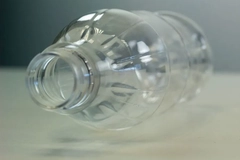Upcycle project transforms non-recyclable plastics into circular packaging
Key takeaways
- The Upcycle project unites 19 partners, including Aimplas and European universities, to convert non-recyclable plastics into sustainable packaging.
- The initiative targets applications like fresh food wraps, beverage bottles, and personal care packaging.
- Aimplas contributes through polymer research, developing compostable and recyclable materials.

Industry stakeholders have jointly launched the Upcycle project to convert non-recyclable plastics into circular packaging solutions. The initiative aims to tackle packaging pollution and reduce reliance on incineration and landfill as waste management systems.
The partnership comprises 19 organizations, including Aimplas, Bioplastech, and research institutes such as Aalborg University in Denmark and University College Dublin in Ireland, among others.
Possible target applications include fresh food flexible packaging, short-lifetime deli packaging, beverage bottles, and personal care packaging.
“With more than 460 million metric tons of plastics produced annually worldwide, only 9% is effectively recycled, while plastic packaging accounts for 40% of demand and 60% of plastic waste in Europe,” says Aimplas.
“Most packaging is used once, with two-thirds discarded within a year, often relying on complex or contaminated plastic streams that persist in the environment for centuries.”

The research project involves integrating sustainable design principles, AI-powered process intensification, and smart polymerization strategies.
Aimplas’ research
Aimplas’s role in the Upcycle project is to research polymers and real-world packaging applications, bridging the gap between sustainability and functionality.
Its Plastic Technology Centre is developing new polyesters and copolyesters, such as polyethylene furanoate, poly(butylene adipate-co-furanoate), and polylactic acid blends, through reactive extrusion, compounding, injection molding, and blow molding technology.
Recently, Aimplas received certification from Din Certco, allowing it to carry out tests that can award companies with “eco-labels” certifying the industrial compostability of organic waste bags.
It also launched a research initiative aimed at improving food contact plastic packaging recycling by developing new methods for cleaning and decontaminating.
In an interview with Packaging Insights, Antonio Ordovás, a packaging researcher at Aimplas, discussed the potential of bioplastics, emphasizing that the industry needs to remain realistic about the scale of adoption.












